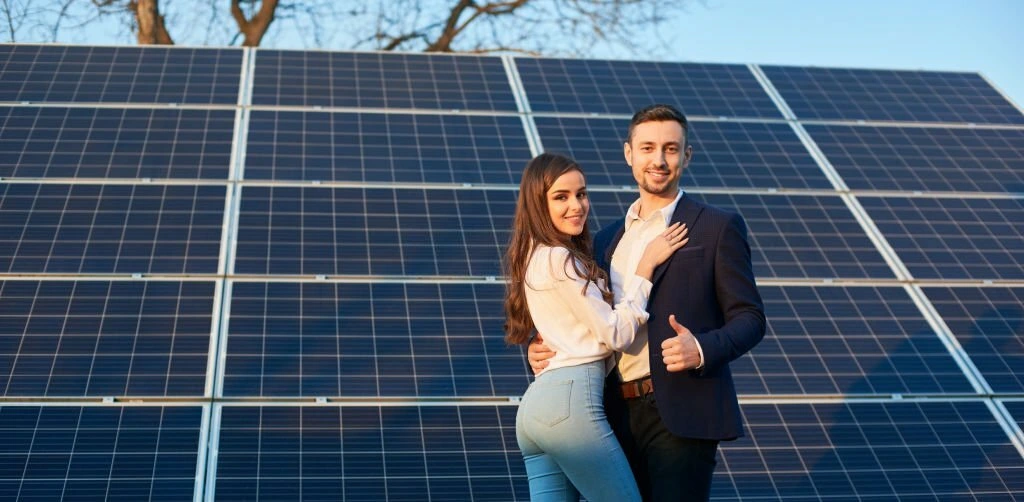If you’ve ever found yourself frustrated by the ever-increasing electric bills, you’re not alone. Many people are exploring the option of installing solar panels to not only curb their energy costs but also to enjoy a range of other advantages.
In this article, we’ll delve into the ways solar panels can make a difference in your energy expenses. We’ll also uncover the potential savings you can anticipate. So, keep reading to discover the bright side of solar energy!
How Can You Save With Solar Panels?
Investing in solar panels for your home is a smart move that puts you in control of your electricity generation, reducing your reliance on utility companies. The financial benefits are substantial, with potential monthly energy cost reductions ranging from 40% to an impressive 70%.
One of the key reasons behind these substantial savings is the ability of solar panels to generate electricity during daylight hours when the sun is shining. This means you draw less power from the grid during peak hours when energy prices are at their highest.
An added bonus is the opportunity to sell any excess electricity you generate back to the grid, providing you with an additional source of savings.
It’s important to note that regular maintenance of your solar panel system is crucial. Proper maintenance not only maximizes efficiency but also extends the lifespan of your solar panels, ensuring that you continue to enjoy reduced energy bills for years to come.
The potential savings you can enjoy with solar panels are influenced by several factors, including where you live, your energy consumption, and the size of your solar panel system. However, it’s worth considering some general estimates to get a sense of what’s possible.
On average, homeowners can anticipate saving approximately $100 to $300 per month with a solar panel system. While this may seem modest, these monthly savings can accumulate to thousands of dollars annually.
Solar Panel Incentives
If you’re considering the installation of solar panels, you’ll be pleased to learn that there are various incentives available that can help alleviate the initial installation costs.
These are as follows:
Federal Tax Credit
The federal tax credit is a significant financial benefit offered by the government to promote solar panel adoption. It allows homeowners to claim a tax credit equal to 26% of the total cost of their solar panel system. This means if your solar panel system has a price tag of $20,000, you can look forward to a substantial tax credit of $5,200. It’s worth noting that the percentage may vary in different tax years, so it’s wise to stay updated on the current rates.
State Incentives
Many states across the country recognize the importance of renewable energy adoption and offer additional incentives to encourage homeowners to install solar panels. These state-level incentives can include rebates, further tax credits, performance-based incentives, and even grants. The availability and specifics of these incentives differ from state to state, so it’s advisable to check with your local authorities or solar installers to explore the options available in your area. These incentives can significantly reduce the overall cost of your solar panel installation, making it even more financially appealing.
Net Metering
Net metering is a fantastic mechanism that allows you to maximize the benefits of your solar panel system. With net metering in place, any surplus electricity generated by your solar panels is fed back into the grid. In return, you receive credits on your energy bill for the excess energy you contribute. This process essentially turns your electric meter backward when your solar panels are producing more electricity than your home consumes. Over time, these credits can accumulate, helping you achieve significant savings on your energy bills. Net metering not only promotes sustainability but also provides a practical way to offset your energy costs.
These incentives and mechanisms, when combined, make solar panel installation an economically sound choice for homeowners. They not only contribute to a greener future but also offer substantial financial benefits.
Costs Associated with Solar Panel Installation
The initial cost of installing solar panels can indeed be a significant investment, but it’s important to recognize that, over time, they essentially become a source of free electricity. This makes solar panels an outstanding long-term investment, primarily due to the substantial reduction in your energy bills.
The savings you accumulate can be quite impressive, particularly if your energy consumption is on the higher side. Solar panels offer a sustainable way to generate power and decrease your reliance on conventional utility sources.
Furthermore, many utility companies provide incentives and tax credits to encourage homeowners to adopt solar panel systems. These incentives can go a long way in offsetting the initial costs of installation, making the transition to solar energy even more appealing from a financial perspective.
Solar panels are designed to last for 25 to 30 years, ensuring that you enjoy long-term savings and benefits. Their durability and efficiency contribute to a reliable source of clean energy for your home.
The cost savings derived from solar panels can become even more significant when combined with other energy efficiency measures, such as improved insulation, LED lighting, and energy-efficient appliances. These measures work in synergy to further reduce your overall energy expenses.
An additional advantage is that solar panels can enhance the value of your home. They are seen as a valuable asset by potential buyers, making your property more attractive on the real estate market.
Choosing The Right Solar Panels
Selecting the right solar panels is a crucial decision that can significantly impact your energy savings and overall solar system performance. Opting for high-quality and efficient solar panels can yield several advantages:
Optimized Energy Production: High-quality solar panels are designed to maximize energy production. They have advanced technologies that can efficiently convert sunlight into electricity. This means you’ll get more power from the same amount of sunlight, increasing your overall energy yield.
Enhanced Light Absorption: Efficient solar panels have the capability to absorb more of the sun’s light spectrum. They can capture a broader range of sunlight, even in less-than-ideal weather conditions. This ensures consistent energy generation throughout the day and under varying weather patterns.
Reduced Reliance on Traditional Sources: By investing in top-notch solar panels, you decrease your dependence on conventional energy sources. This not only results in cost savings but also reduces your carbon footprint, contributing to a greener and more sustainable lifestyle.
Low Maintenance Costs: Solar panels are known for their low maintenance requirements. Once installed, they generally require minimal upkeep. This translates to long-term cost savings as you get the maximum energy output without incurring high maintenance expenses.
To make the most of your solar panels, consider the following tips:
- Install them in an area with ample sunlight to ensure maximum energy production.
- Choose high-quality panels with a reputable track record of performance and durability.
- Work with a professional installer to ensure proper placement and system setup.
- Regularly monitor your solar system’s performance to identify any issues and address them promptly.
By investing in quality solar panels and optimizing their installation, you can enjoy lower energy bills, a reduced environmental impact, and a more sustainable way of living.
Conclusion
In conclusion, solar panels offer a transformative solution for homeowners seeking to reduce energy costs and embrace sustainable living. By selecting high-quality, efficient panels and placing them in sun-rich areas, individuals can harness the full potential of solar energy. These panels not only optimize energy production but also minimize reliance on traditional power sources, resulting in significant savings and a greener lifestyle. With the added benefit of low maintenance costs, solar panels represent a wise long-term investment for those looking to enjoy a lower energy bill, reduce their carbon footprint, and contribute to a more environmentally responsible future.
Recommended Article for You – How to Choose the Right Solar Maintenance Services for Your System






